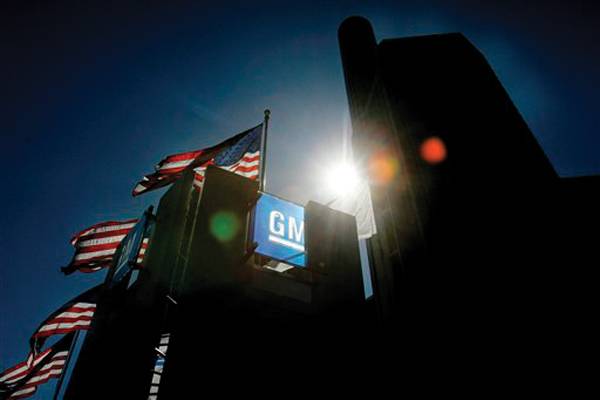ADAMS: Auto bail = fail

**FILE** In this July 15, 2008 file photo, the General Motors world headquarters in Detroit is seen on. With its cash stockpile perilously low and the prospect of government help fading, General Motors Corp. probably is talking with creditors to buy time until Barack Obama arrives in Washington. (AP Photo/Carlos Osorio, File)
November 16, 2008
I am not the Democrat I thought I was.
Last Wednesday, the Bush administration signaled its plan to reject a proposal — soon to be a drafted bill — by Democrats to immediately send $25 billion of the $700 billion financial rescue program to Detroit’s “Big Three” automakers (GM, Chrysler, and Ford) — with no strings attached.
Though writing this is painful, Bush is right.
Yes, the auto industry is part of America’s proud industrial past. History books told and tell of the great Henry Ford, father of the modern assembly line used for mass production. They acclaim “Fordism,” as the great man’s mantra in which huge numbers of cheap automobiles were produced for consumers, the industry still made huge profits, and workers received what could have, in the early 1900s, been considered huge wages.
As should now be clear, however, auto manufacture, at least in its current form, is no longer one of the hallmarks of the American economy — if any hallmarks remain. Though the industrial sector is responsible for a significant 20.6 percent of our country’s GDP, the auto industry’s input is now minimal, the Fed having reported that industrial output dropped 1.1 percent last month, “led by an 11.9 percent drop in production of motor vehicles and parts.”
What was once a highly profitable economic subsector which employed hundreds of thousands of Americans, is now an unprofitable economic sector which is boosting the country’s dismal unemployment numbers by the day.
If the American people are calling for the production of more fuel-efficient vehicles, as the media definitely makes them out to be, the auto industry would rationally produce them, sell them at a cost that Americans are willing to pay, and reap the rewards. Presently, Detroit’s Three are not accomplishing this task. Yes, research and design and subsequent production take time and capital, but if the auto industry isn’t forced to get its act together now — something that a string-free $25 billion has no hope of accomplishing — how can we expect it ever to do so?
Perhaps the Detroit companies would actually use funds to invest in more fuel-efficient cars for the good of Americans, but having not done so yet — at least not to a great enough extent to bring profitability — we cannot expect them to automatically do so now. Though it’s no $700 billion — which I might add we as citizens should know what’s being done with it — $25 billion is a lot of money to simply postpone a flailing industry’s eventual capitulation. If people aren’t buying the cars that they’re currently producing — even now, with $2-a-gallon gas prices — they are not going to suddenly start buying them when prices inevitably skyrocket again, as that crazy T. Boone Pickens promises they soon will.
Americans might not be the most farsighted people on the planet, but most probably regard the purchase of a car as a long-term act — an investment that is clearly tied to the future price of gas. A few months of $2-a-gallon gas isn’t going to magically send thousands, who were riding CyRide over the summer, to Charles Gabus Ford to buy the 15-mpg 2009 F-150 this winter. And if people don’t buy cars, no number of bailout dollars is going to save the millions of U.S. jobs in and related to car manufacturing.
So again, I am giving my props to Bush.
But what about all those unemployed workers, my inner Democrat asks me? Well, there does seem to be a solution for the auto industry — one that I pray the next administration, if not this one, initiates: Offer auto makers — those which produce in and employ the citizens of the United States, I should add, and not just the Big Three — the chance to bid on loans — I repeat, loans — but give them with strings attached. The government is already “making it rain” more than Lil’ Wayne ever will, so it might as well divert billions of bills — likely even more than 25 — to auto makers who are willing and able to play a central role in our nation’s future. Hopefully the Big Three can play a part, as they currently support more than a million Americans.
But the bidding, which will preserve capitalist competition over communist corporatism, is key — so too are the strings. If receiving government loans, the nation’s auto manufacturers must invest it in producing vehicles with a minimum mpg-rating, or better yet, a percentage of pure electrics or hybrids. In doing so, the lowest bidders will not only survive through adaptation — something that all successful businesses must do — and retain workers, but will hire thousands of new workers while crucially investing in a different, better future for America.
Reading this from his grave, Ford might be disheartened that the auto industry of his day is not the auto industry of the future. Yet take heart, Ford, because your assembly line production process — though much automated now — is still vital, and you can retain your proud position in our history textbooks. What must come after your paragraph, however, is the success story of an American auto industry that used your brilliance to create far different products than you could have ever imagined. The sooner this is realized — and Congress compels it to — the better.
— Steve Adams is a graduate student in journalism and mass communication from Annapolis, Md.
















